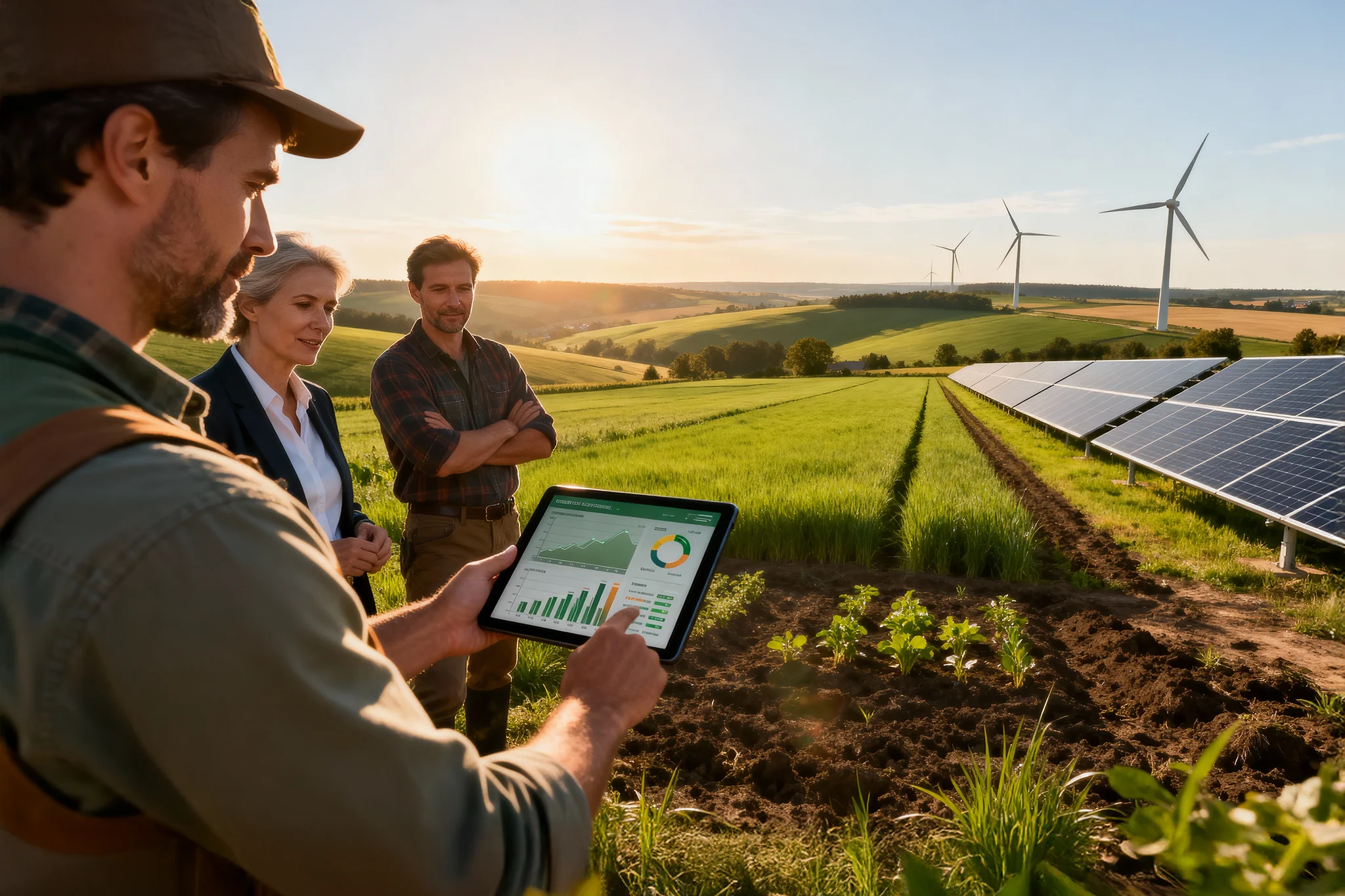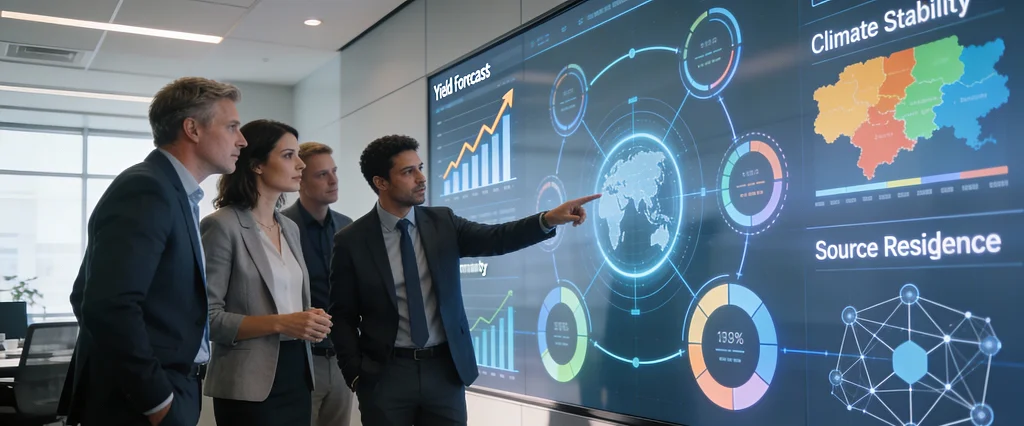Synopsis:
From vision to global scale: The power of Cropin Cloud
Shaping the future: AI technologies for agriculture in Europe and the US
In this blog, we highlight three distinct ways Cropin is making a difference
- Walmart - Building supply chain resilience and a competitive edge for the world’s largest retailer
- EIT food - Empowering the transition to regenerative agriculture, for a future-ready food ecosystem
- Loacker - Ensuring sustainable sourcing for one of the world’s most loved chocolate brands
Real deployments, real results
Case point 1:
Walmart - pioneering AI‑first digital transformation in retail

By leveraging quality forecasts, crop readiness insights, and risk assessments, Cropin empowers agri-food stakeholders to shift to precision from guesswork. These insights enable Walmart to balance cost, quality, and sustainability in a dynamic market.
The platform’s impact:
- Real-time crop readiness detection: Cropin has automated crop stage detection using advanced AI and real-time analytics. This innovation removes the uncertainties of manual coordination. It empowers procurement teams with precise, data-driven insights for timely strategic decision-making. It has paved the way for a seamless and efficient supply chain.
- Predictable supply and quality: The platform ensures a steady supply of high-quality produce with maximized shelf life at optimized rates. Cropin’s capability to predict future crop yields and supply stability allows Walmart to proactively manage pricing strategies without compromising quality.
- Climate resilience: Automated tools provide granular and regional insights into crop health, extreme weather risks, and pest outbreaks, making the entire supply chain more robust against climate shocks. Cropin’s dynamic risk assessment offers predictive insights that allow procurement teams to act proactively, mitigating potential challenges.
- Predictive analytics: Cropin’s predictive analytics, which integrates historical trends and real-time data to forecast potential disruptions, offers various insights, including advanced yield estimation and pincode-level weather insights. This removes the stress of last-minute adjustments.
The sustainability bonus:
Cropin’s sustainability impact dashboard strengthens compliance for retailers by digitally tracking the origin of production. Our digital Monitoring, Reporting, and Verification (dMRV) offering revolutionizes data collection, validation, and intelligence. The unbiased dMRV from Cropin Cloud validates metrics such as greenhouse gas (GHG) emissions, water usage, and deforestation impact, supporting regulatory requirements and instilling consumer confidence.
Case point 2:
EIT Food - A powerful story of Europe-wide regenerative agriculture: making investments measurable, predictable, and profitable

The regenerative dilemma: unlocking verifiable outcomes
The agri-food sector is rapidly advancing regenerative agriculture to support corporate sustainable sourcing requirements. However, widespread adoption faces a critical challenge: the lack of verifiable, measurable outcomes. This problem is particularly acute in potato farming, where processors seek tubers with high solid content for superior chips and fries. They often worry that regenerative methods might reduce yields in the initial years, directly impacting their supply chain stability and profitability.
Precision, profit, and the planet
- 5% increase in crop yield
- 15% reduction in pesticide use
- 5% decrease in water usage
- 1.5% increase in solid content (a key quality metric for chip/fry processors)
Future-proofing European agri-food sectors
Case point 3:
Loacker - digitising the Hazelnut value chain and securing the sustainable sourcing commitment for the world's most loved chocolate brand

The challenge: a crisis of visibility, quality, and data
Loacker’s dedication to sustainable, quality-controlled sourcing immediately aimed to address the fundamental challenges of traditional agriculture:
- Poor visibility at the farm: The company lacked real-time insight into farmers’ cultivation processes, making it impossible to effectively monitor plots or provide timely technical advice.
- Quality risk: Despite hazelnuts being inherently sustainable, threats like the stink bug infestation could quickly destroy the fruit, jeopardizing the quality of the raw material destined for their famous wafer cream.
- Protocol enforcement: Ensuring that all 80 regional partners strictly adhered to the rigorous, above-standard agronomic protocols required digital verification.
The solution: AI-powered traceability from bloom to bar
- Digital protocol adherence: The platform provided agronomists with a constant reference point, ensuring compliance with agronomic protocols that exceed national legal standards.
- Quality control: At the collection centers, technicians now use the SmartFarm application for all weighing, sampling, and quality checks, immediately segregating hazelnuts by quality grade.
- End-to-end tracing: The solution tracks the hazelnut's entire life cycle, from georeferenced planting data and crop age forecasting to the final processing plant in South Tyrol, confirming the Italian origin and quality.
The impact: precision, profitability, and a circular economy
- Total farmers: 85+
- Total plots audited: 95+
- Harvest managed: 2,000+ Tonnes
This deployment demonstrates that a defined agronomic protocol fueled by digital technology delivers collective benefits:
- Empowers local growers to improve their livelihood through constant guidance
- Helps the brand guarantee premium quality
- Ensures sustainable sourcing is met with technological precision
Conclusion: leading the global agri-intelligence movement
Our experience across over 100 countries and numerous deployments in Europe and the US confirms a crucial trend: Cropin has emerged as an undisputed leader in the Agritech domain, with our AI platform being the biggest competitive edge. This deep, demonstrated expertise is why European and US customers choose to work with us.
These regions are at the forefront of digital adoption, and we see the same enthusiasm driving the Agritech sector. We remain committed to partnering with the region’s agri-food players on large-scale transformation projects, acting as their trusted partner of choice to build a climate-resilient future.
Author Bio
Dileep M
Dileep leads Marketing at Cropin, where he drives brand growth and strengthens the company’s positioning across global markets. Over the last four years, he has been instrumental in shaping Cropin’s brand and demand-generation strategies that contribute to customer acquisition. He brings close to two decades of experience in communication, branding, and marketing for enterprise technology companies. With a strong focus on narrative building and strategic brand development, Dileep enables Cropin’s continued global expansion.








